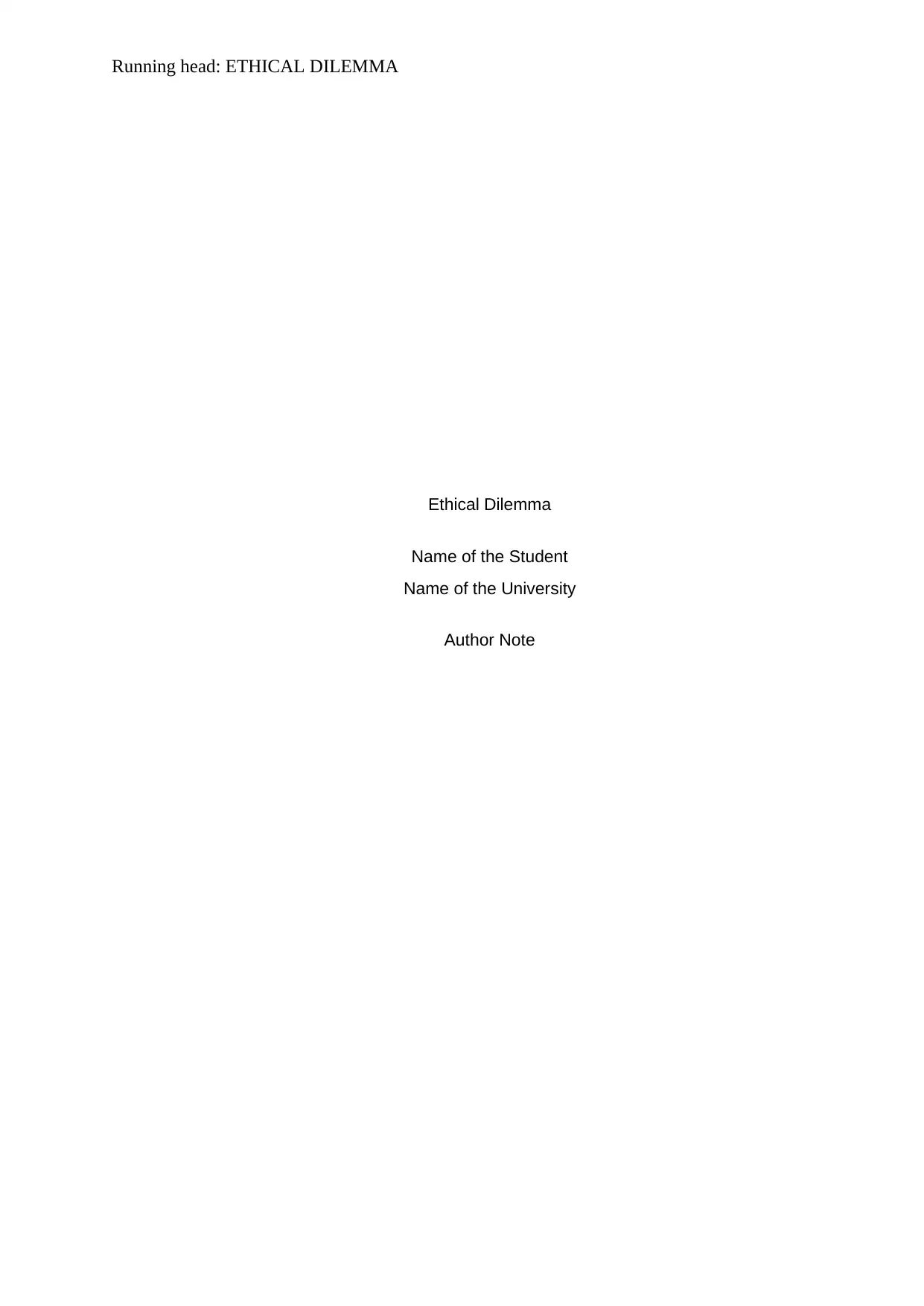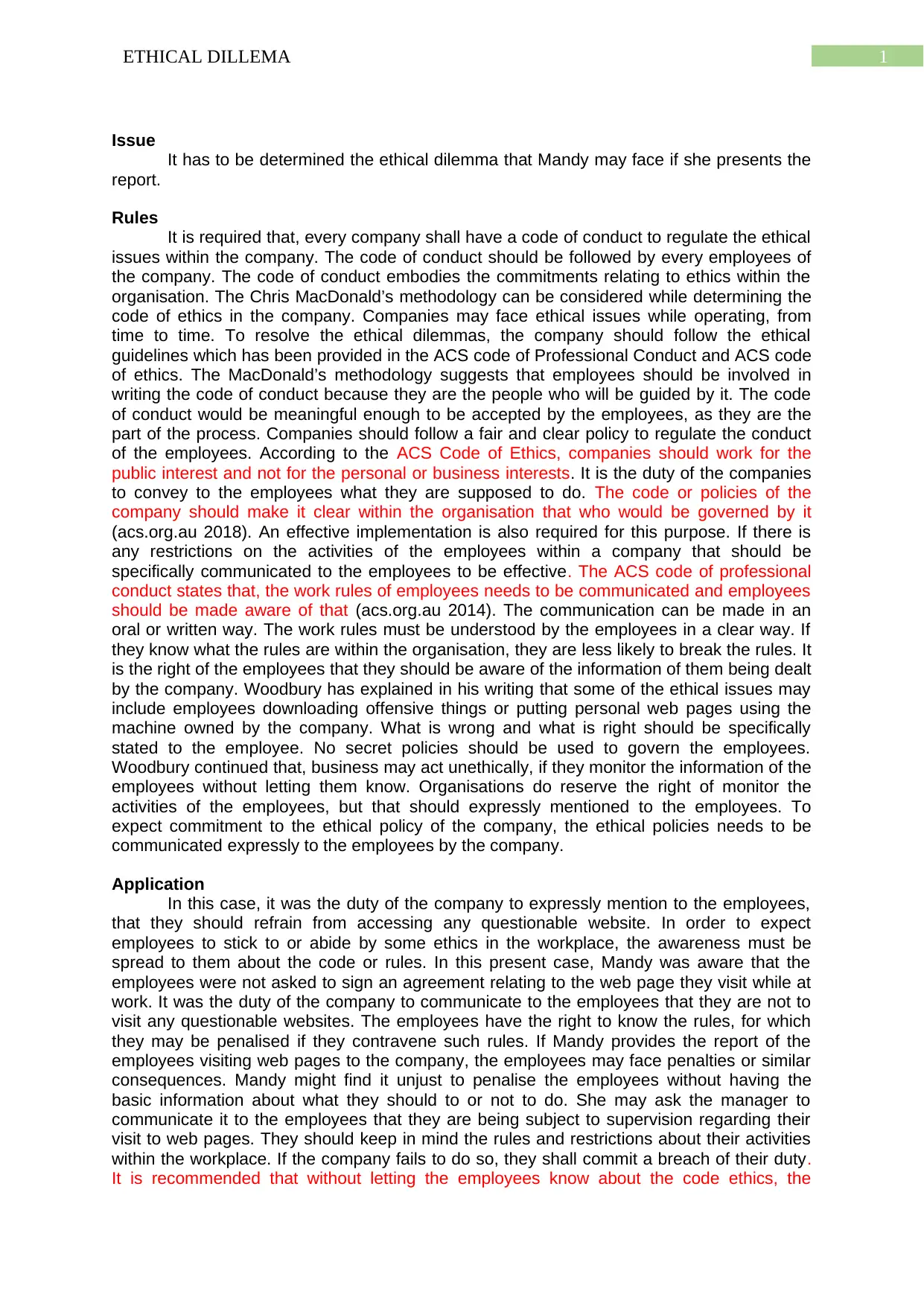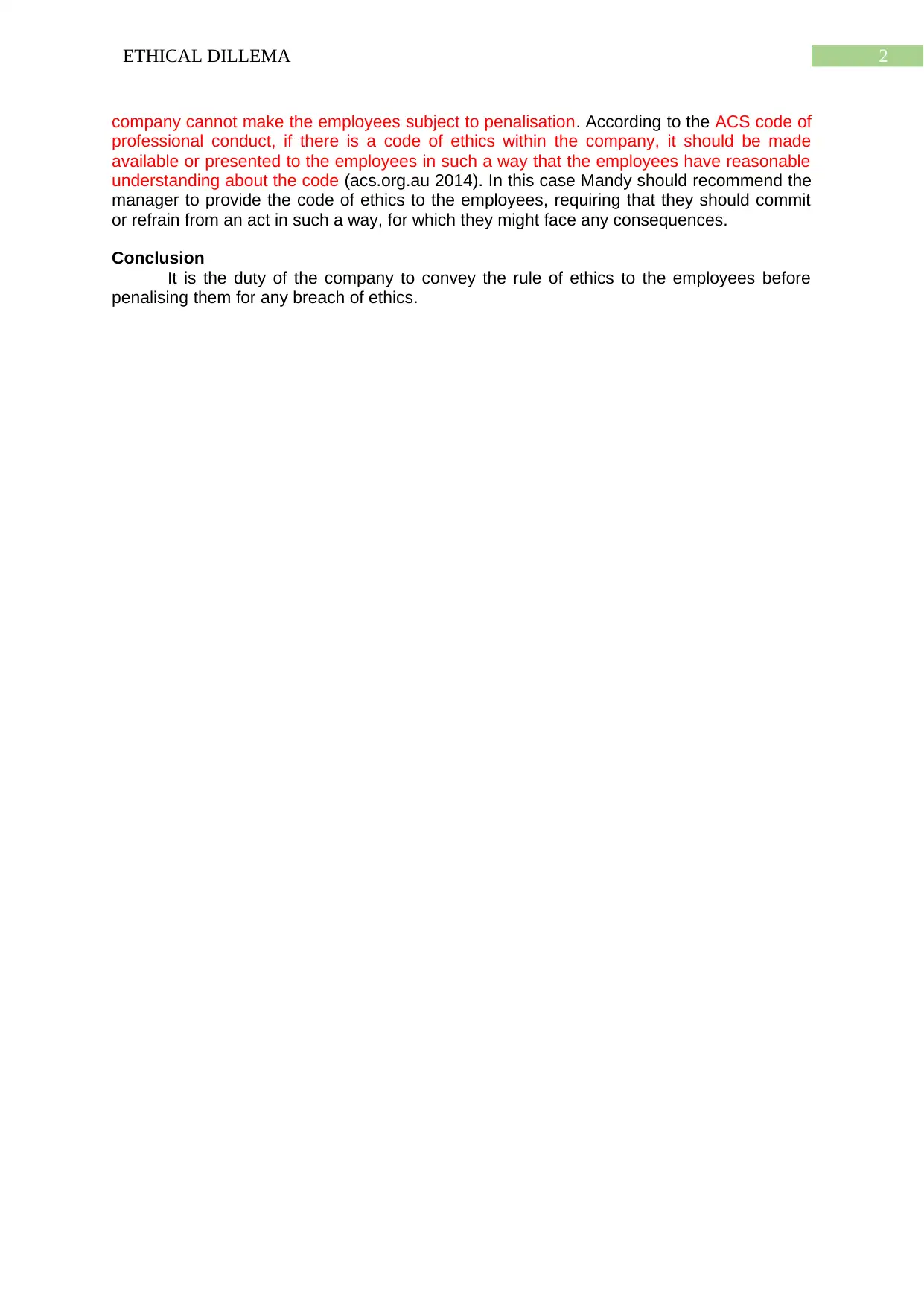Ethical Dilemma Report: Employee Conduct and Ethical Guidelines
VerifiedAdded on 2023/06/05
|4
|979
|61
Report
AI Summary
This report examines an ethical dilemma faced by Mandy regarding employee internet usage and potential repercussions. It delves into the importance of a company's code of conduct, referencing the ACS Code of Ethics and Chris MacDonald's methodology. The report emphasizes the necessity for clear communication of ethical guidelines and work rules to employees, highlighting the ethical implications of monitoring employee activities without prior notification. It argues that the company has a duty to inform employees about expected behaviors before enforcing penalties. The report recommends that Mandy advise her manager to communicate the code of ethics to employees, ensuring they are aware of the rules and potential consequences of non-compliance. The conclusion reinforces the principle that employees must be informed of ethical guidelines before being penalized for any breach. The report is based on the ACS code of ethics and professional conduct.

Running head: ETHICAL DILEMMA
Ethical Dilemma
Name of the Student
Name of the University
Author Note
Ethical Dilemma
Name of the Student
Name of the University
Author Note
Paraphrase This Document
Need a fresh take? Get an instant paraphrase of this document with our AI Paraphraser

1ETHICAL DILLEMA
Issue
It has to be determined the ethical dilemma that Mandy may face if she presents the
report.
Rules
It is required that, every company shall have a code of conduct to regulate the ethical
issues within the company. The code of conduct should be followed by every employees of
the company. The code of conduct embodies the commitments relating to ethics within the
organisation. The Chris MacDonald’s methodology can be considered while determining the
code of ethics in the company. Companies may face ethical issues while operating, from
time to time. To resolve the ethical dilemmas, the company should follow the ethical
guidelines which has been provided in the ACS code of Professional Conduct and ACS code
of ethics. The MacDonald’s methodology suggests that employees should be involved in
writing the code of conduct because they are the people who will be guided by it. The code
of conduct would be meaningful enough to be accepted by the employees, as they are the
part of the process. Companies should follow a fair and clear policy to regulate the conduct
of the employees. According to the ACS Code of Ethics, companies should work for the
public interest and not for the personal or business interests. It is the duty of the companies
to convey to the employees what they are supposed to do. The code or policies of the
company should make it clear within the organisation that who would be governed by it
(acs.org.au 2018). An effective implementation is also required for this purpose. If there is
any restrictions on the activities of the employees within a company that should be
specifically communicated to the employees to be effective. The ACS code of professional
conduct states that, the work rules of employees needs to be communicated and employees
should be made aware of that (acs.org.au 2014). The communication can be made in an
oral or written way. The work rules must be understood by the employees in a clear way. If
they know what the rules are within the organisation, they are less likely to break the rules. It
is the right of the employees that they should be aware of the information of them being dealt
by the company. Woodbury has explained in his writing that some of the ethical issues may
include employees downloading offensive things or putting personal web pages using the
machine owned by the company. What is wrong and what is right should be specifically
stated to the employee. No secret policies should be used to govern the employees.
Woodbury continued that, business may act unethically, if they monitor the information of the
employees without letting them know. Organisations do reserve the right of monitor the
activities of the employees, but that should expressly mentioned to the employees. To
expect commitment to the ethical policy of the company, the ethical policies needs to be
communicated expressly to the employees by the company.
Application
In this case, it was the duty of the company to expressly mention to the employees,
that they should refrain from accessing any questionable website. In order to expect
employees to stick to or abide by some ethics in the workplace, the awareness must be
spread to them about the code or rules. In this present case, Mandy was aware that the
employees were not asked to sign an agreement relating to the web page they visit while at
work. It was the duty of the company to communicate to the employees that they are not to
visit any questionable websites. The employees have the right to know the rules, for which
they may be penalised if they contravene such rules. If Mandy provides the report of the
employees visiting web pages to the company, the employees may face penalties or similar
consequences. Mandy might find it unjust to penalise the employees without having the
basic information about what they should to or not to do. She may ask the manager to
communicate it to the employees that they are being subject to supervision regarding their
visit to web pages. They should keep in mind the rules and restrictions about their activities
within the workplace. If the company fails to do so, they shall commit a breach of their duty.
It is recommended that without letting the employees know about the code ethics, the
Issue
It has to be determined the ethical dilemma that Mandy may face if she presents the
report.
Rules
It is required that, every company shall have a code of conduct to regulate the ethical
issues within the company. The code of conduct should be followed by every employees of
the company. The code of conduct embodies the commitments relating to ethics within the
organisation. The Chris MacDonald’s methodology can be considered while determining the
code of ethics in the company. Companies may face ethical issues while operating, from
time to time. To resolve the ethical dilemmas, the company should follow the ethical
guidelines which has been provided in the ACS code of Professional Conduct and ACS code
of ethics. The MacDonald’s methodology suggests that employees should be involved in
writing the code of conduct because they are the people who will be guided by it. The code
of conduct would be meaningful enough to be accepted by the employees, as they are the
part of the process. Companies should follow a fair and clear policy to regulate the conduct
of the employees. According to the ACS Code of Ethics, companies should work for the
public interest and not for the personal or business interests. It is the duty of the companies
to convey to the employees what they are supposed to do. The code or policies of the
company should make it clear within the organisation that who would be governed by it
(acs.org.au 2018). An effective implementation is also required for this purpose. If there is
any restrictions on the activities of the employees within a company that should be
specifically communicated to the employees to be effective. The ACS code of professional
conduct states that, the work rules of employees needs to be communicated and employees
should be made aware of that (acs.org.au 2014). The communication can be made in an
oral or written way. The work rules must be understood by the employees in a clear way. If
they know what the rules are within the organisation, they are less likely to break the rules. It
is the right of the employees that they should be aware of the information of them being dealt
by the company. Woodbury has explained in his writing that some of the ethical issues may
include employees downloading offensive things or putting personal web pages using the
machine owned by the company. What is wrong and what is right should be specifically
stated to the employee. No secret policies should be used to govern the employees.
Woodbury continued that, business may act unethically, if they monitor the information of the
employees without letting them know. Organisations do reserve the right of monitor the
activities of the employees, but that should expressly mentioned to the employees. To
expect commitment to the ethical policy of the company, the ethical policies needs to be
communicated expressly to the employees by the company.
Application
In this case, it was the duty of the company to expressly mention to the employees,
that they should refrain from accessing any questionable website. In order to expect
employees to stick to or abide by some ethics in the workplace, the awareness must be
spread to them about the code or rules. In this present case, Mandy was aware that the
employees were not asked to sign an agreement relating to the web page they visit while at
work. It was the duty of the company to communicate to the employees that they are not to
visit any questionable websites. The employees have the right to know the rules, for which
they may be penalised if they contravene such rules. If Mandy provides the report of the
employees visiting web pages to the company, the employees may face penalties or similar
consequences. Mandy might find it unjust to penalise the employees without having the
basic information about what they should to or not to do. She may ask the manager to
communicate it to the employees that they are being subject to supervision regarding their
visit to web pages. They should keep in mind the rules and restrictions about their activities
within the workplace. If the company fails to do so, they shall commit a breach of their duty.
It is recommended that without letting the employees know about the code ethics, the

2ETHICAL DILLEMA
company cannot make the employees subject to penalisation. According to the ACS code of
professional conduct, if there is a code of ethics within the company, it should be made
available or presented to the employees in such a way that the employees have reasonable
understanding about the code (acs.org.au 2014). In this case Mandy should recommend the
manager to provide the code of ethics to the employees, requiring that they should commit
or refrain from an act in such a way, for which they might face any consequences.
Conclusion
It is the duty of the company to convey the rule of ethics to the employees before
penalising them for any breach of ethics.
company cannot make the employees subject to penalisation. According to the ACS code of
professional conduct, if there is a code of ethics within the company, it should be made
available or presented to the employees in such a way that the employees have reasonable
understanding about the code (acs.org.au 2014). In this case Mandy should recommend the
manager to provide the code of ethics to the employees, requiring that they should commit
or refrain from an act in such a way, for which they might face any consequences.
Conclusion
It is the duty of the company to convey the rule of ethics to the employees before
penalising them for any breach of ethics.
⊘ This is a preview!⊘
Do you want full access?
Subscribe today to unlock all pages.

Trusted by 1+ million students worldwide

3ETHICAL DILLEMA
References:
acs.org.au. 2018. [online] Available at: https://www.acs.org.au/content/dam/acs/acs-
documents/Code-of-Ethics.pdf [Accessed 3 Oct. 2018].
acs.org.au. 2014. [online] Available at: https://www.acs.org.au/content/dam/acs/rules-and-
regulations/Code-of-Professional-Conduct_v2.1.pdf [Accessed 3 Oct. 2018].
References:
acs.org.au. 2018. [online] Available at: https://www.acs.org.au/content/dam/acs/acs-
documents/Code-of-Ethics.pdf [Accessed 3 Oct. 2018].
acs.org.au. 2014. [online] Available at: https://www.acs.org.au/content/dam/acs/rules-and-
regulations/Code-of-Professional-Conduct_v2.1.pdf [Accessed 3 Oct. 2018].
1 out of 4
Related Documents
Your All-in-One AI-Powered Toolkit for Academic Success.
+13062052269
info@desklib.com
Available 24*7 on WhatsApp / Email
![[object Object]](/_next/static/media/star-bottom.7253800d.svg)
Unlock your academic potential
Copyright © 2020–2026 A2Z Services. All Rights Reserved. Developed and managed by ZUCOL.



